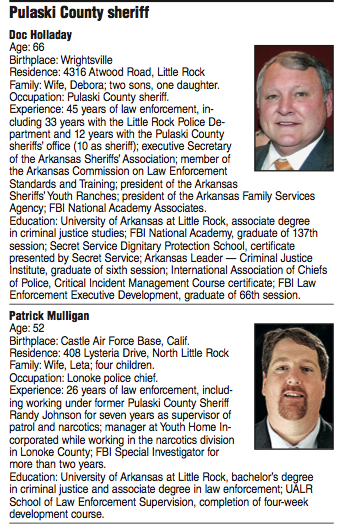Pulaski County Sheriff Doc Holladay has run a more relaxed campaign this election cycle than in years past. He's recycling old campaign signs, has purchased just a handful of city-bus advertisements and has distributed a few stacks of handouts.

In total, he's spent just $3,150 since February, according to a campaign-finance report -- a far cry from the $23,000 he spent during that period in 2010.
In that year he faced Republican opponent Patrick Mulligan, a rematch from a 2008 race. This year he faces Mulligan again after winning roughly 70 percent of the vote in the two previous face-offs.
"It's always been a goal of mine," Mulligan said. "And of course I picked a hard opponent to run against."
[INTERACTIVE LIST: Find the local races in your county or city]
After the previous two defeats by Holladay, Mulligan lost support from the GOP and is running on the Libertarian ticket.
Mulligan -- Lonoke's police chief -- reported no monetary campaign contributions or expenditures in May's financial disclosure report, and he failed to file a report for the latest reporting period by the Nov. 1 deadline.
State law requires financial reports to be filed by candidates that have spent or received more than $500. According to Arkansas Code Annotated 7-6-202, a candidate who knowingly fails to submit a disclosure report could be found guilty of a Class A misdemeanor.
If elected, Holladay has said his next term would be his last before retirement. Sheriffs' terms last two years, but also on Tuesday's ballot is an initiative that would extend the terms to four years.
Mulligan has focused his campaign on addressing crowding at the Pulaski County jail by incorporating more preventive measures, like establishing a job-training program to reduce recidivism, engaging people in the county at the community level and training deputies to use more discretion when dealing with first-time, nonviolent offenders.
Compassion and communication with inmates are key, he said.
"You can lock people away all day long and do what you need to do, but in the end you're not resolving anything," Mulligan said. "If you can get three or four people, listen to what they're saying, help them get jobs -- that's three or four people that's not going to repeat and come back in your jail."
Holladay said his deputies already are doing more community policing than other area law enforcement agencies.
"In Little Rock they seem to be going from call to call, but out in the county, deputies have more of an opportunity to do that preventative patrolling," Holladay said. "I can assure you they know the community that they police; they know the neighborhoods; they go to crime watch meetings; they go to neighborhood association meetings; and the people in those communities know who those deputies are by name."
Holladay said he has a few things he'd like to accomplish before retiring, including purchasing body cameras for his deputies and raising starting salaries for new recruits from the current $34,000 to better compete with other forces in central Arkansas. The Little Rock Police Department, for example, has a starting pay around $40,000.
"The role of sheriff, it always changes in some fashion, but there's some things that always remain the same in terms of what the public expects," Holladay said.
Metro on 11/06/2016
